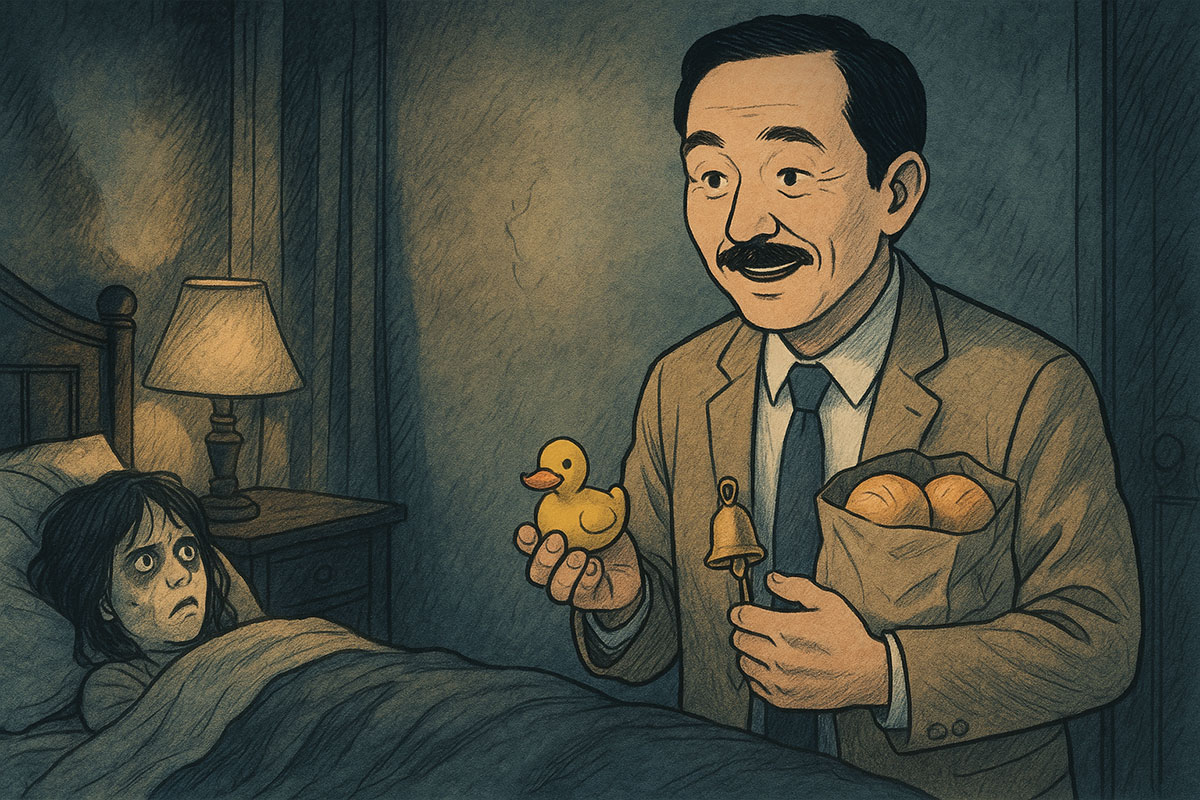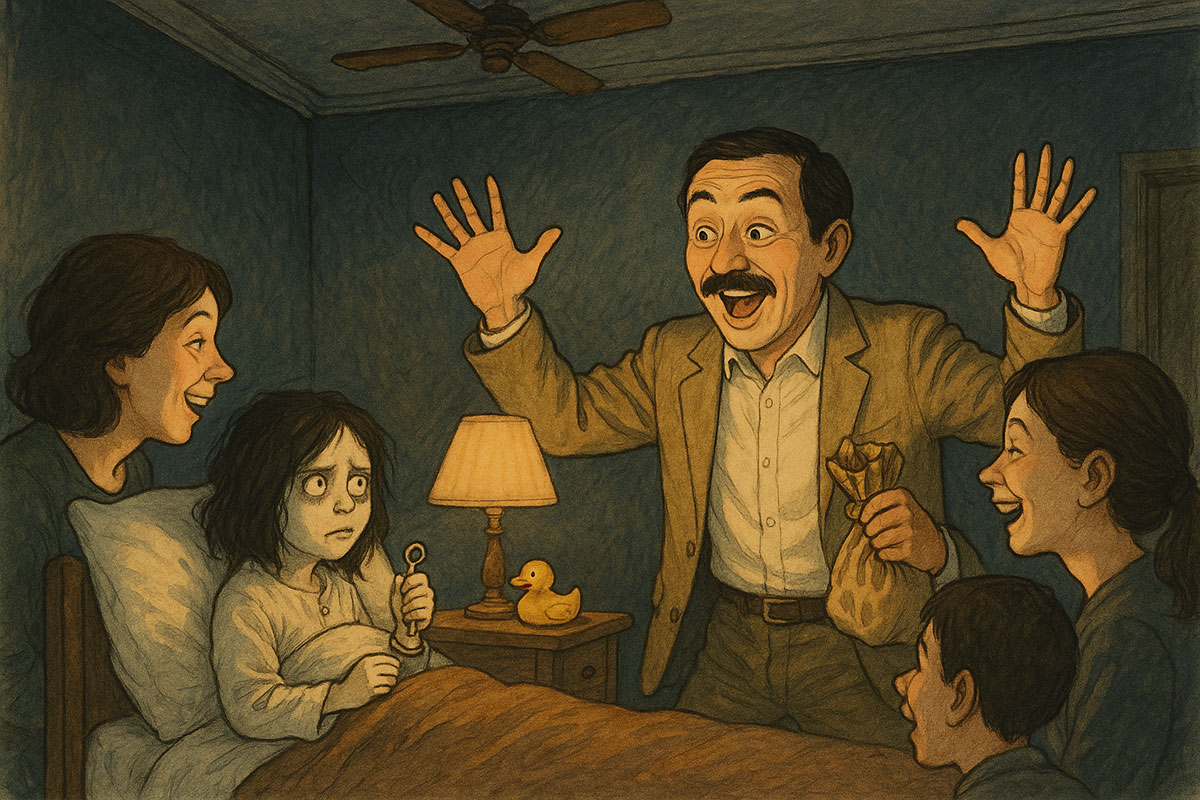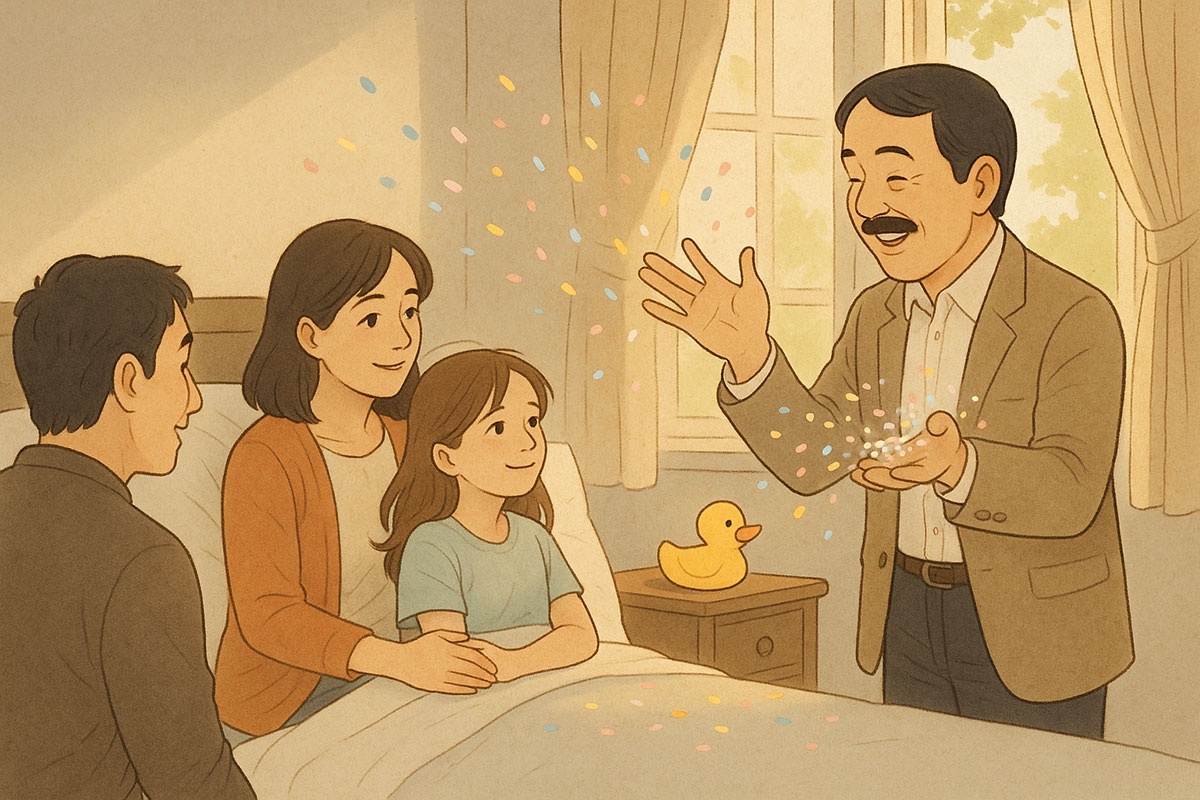
|
Getting your Trinity Audio player ready...
|

Saito Hitori:
People think an exorcism is about fighting something scary. But you know, fear only grows when you feed it more fear. I’ve always believed that laughter, gratitude, and kindness are stronger than any ghost or demon. If the room feels heavy, it’s not because evil is strong—it’s because we’ve forgotten how to breathe, how to smile, how to say ‘thank you.’
So tonight, instead of crosses and shouting, I brought buns, a rubber duck, and a bell. Why? Because even the darkest places can’t survive if we remind ourselves: ‘I’m lucky, I’m loved, I’m alive.’ This story isn’t about chasing away shadows. It’s about remembering the light we already carry. And once we remember that, the shadows leave on their own.
(Note: This is an imaginary conversation, a creative exploration of an idea, and not a real speech or event.)

ACT I — THE ROOM THAT FORGOT HOW TO BREATHE

INT. OLD HOUSE – SECOND-FLOOR BEDROOM – NIGHT
Curtains smother the windows. A single lamp flickers, making the wallpaper seem to crawl. A GIRL (12), pale and exhausted, lies on the bed. Her chest heaves. The air feels like wet wool.
A MOTHER (40s), eyes red from crying. A PRIEST (50s), sleeves rolled, a crucifix tight in his hand. A NURSE (30s), trying to look brave. An UNCLE (40s), crushed ball cap in his hands. Everyone’s waiting for thunder that won’t stop.
PRIEST
(whispered, to the Mother)
When it speaks, don’t answer it. We hold the line.
A LOW, UNEARTHLY GROWL crawls out of the Girl’s throat.
GIRL (DEMONIC)
Leeeeeeave.
The lamp buzzes, dies. Darkness swallows the room—then the hallway light spills in as the door eases open.
Enter SAITO HITORI (60s), trim suit, soft shoes, a smile like open windows in spring. He doesn’t look armed for war; he looks ready for tea.
HITORI
Evening. I heard there was a party with terrible music.
He flicks a small LED lantern on. Gentle glow. Everyone blinks.
PRIEST
(guarded)
Sir, this is… delicate. We’re in the middle of—
HITORI
(friendly bow)
I’ll keep quiet—after I say one noisy thing.
He crosses to the bed, not hurried, not slow—just… human. He sets the lantern on the nightstand, pulls a folded handkerchief from his pocket, arranges it neatly like he’s setting a tiny stage.
HITORI
(to the Girl)
Hi. I’m Hitori. I brought the world’s most powerful tool.
He produces—dramatically—a paper bag. The Uncle squints. The Nurse tilts her head.
UNCLE
What’s in there?
HITORI
Science.
He opens the bag with a practiced flourish. Inside: a handful of wrapped sweet buns, a silly rubber duck, and a small bell.
The demonic growl deepens, as if insulted by carbohydrates.
GIRL (DEMONIC)
Leeeave.
HITORI
Sure. But first—snack time. If I were a ghost living rent-free, I’d still pay in laughter.
The Priest frowns, bracing for blasphemy. None arrives. Just a smile.
HITORI
(to the room)
Let me be plain. Fear makes the room forget how to breathe. We’re going to teach it again.
He turns to the Mother.
HITORI (CONT’D)
We’ll change three things: air, posture, words.
He gently cracks the window. Fresh night air slips in. He straightens the Mother’s shoulders with two fingertips.
HITORI (CONT’D)
Number one—air. We breathe like we’re not auditioning for the world’s saddest sigh contest. In. Out. Slow.
Everyone breathes with him. The Nurse visibly steadies. The Uncle copies, awkward but earnest.
HITORI
Number two—posture. Fear wants your spine to curl. Don’t give it the satisfaction.
He gives the Priest a look. The Priest inhales, eases his shoulders back despite himself.
HITORI
Number three—words. We’re going to use the light ones. They lift. Ever tried picking up a couch alone? Bad for the back. We’ll lift together.
He sits on the edge of the bed, careful not to crowd the Girl.
HITORI (GENTLY)
Sweetheart, if you’re listening under that loud roommate, blink once.
Nothing. The lamp flickers back to life—one stubborn filament refusing to die. The Girl’s lips curl.
GIRL (DEMONIC)
I will break your—
HITORI
(interrupting, cheerful)
—fast? I agree. Most important meal of the day.
He rings the tiny bell—ting. The sound is clean, innocent. It doesn’t fight the darkness; it refuses to belong to it.
HITORI
(to the… roommate)
Listen, tough guy. You’re on a 30-day notice. Not because we hate you. Because you’re cramped here. And no one heals in a cramped place—not even a shadow.
He places the rubber duck beside the Girl’s hand.
HITORI
This is your Exit Buddy. When it’s time, you follow the duck. Ducks know how to leave a pond. It’s their whole brand.
A stifled laugh escapes the Nurse. The room exhales, just a little.
PRIEST
Mr. Saito, this isn’t a comedy.
HITORI
No. It’s medicine. Laughter is the body remembering the door isn’t locked.
He lowers his voice, speaking to the Girl beneath the voice.
HITORI (SOFT)
Lonely hurts the worst, doesn’t it? It wears anger like armor. You don’t need armor with me. I only bring tea.
The Girl’s eyelids flutter. The Mother clamps a hand over her mouth, hope like a dangerous bird in her chest.
HITORI
We’ll start simple. Everyone, repeat after me.
“I’m lucky.”
Silence.
HITORI
I know, sounds silly. But your nervous system reads those words like sunlight. Let’s try it.
MOTHER
(hoarse)
…I’m lucky.
NURSE
I’m lucky.
UNCLE
I’m… lucky.
The Priest hesitates—then:
PRIEST
I’m lucky.
HITORI
(to the Girl)
Your turn. One tiny “lucky,” and I’ll shut up for a whole minute. Big prize.
A beat. The Girl’s throat moves.
GIRL (FAINT, HER OWN VOICE)
…Lucky.
The room shivers as if someone opened a second window you can’t see. The lamp glows easier.
HITORI
That’s the breath I was looking for. Good. We’re going to keep breathing like that, even if the roommate throws a tantrum. Ready for the tantrum?
He taps the paper bag. Crinkle. The demon growls again, but it’s thinner—like a speaker turned down two clicks.
HITORI (TO ALL)
Lesson one lands. Ten minutes break from fear. Stay with me.
He smiles at the Mother—steady, ordinary, indestructible.
CUT TO BLACK.
ACT II — THE NEGOTIATION

INT. SAME BEDROOM – LATER THAT NIGHT
The window is open wider now. The LED lantern and the lamp share an easy truce. On the dresser: the paper bag, a steaming cup of tea, a small plate of sweet buns. The rubber duck presides over the nightstand like a ridiculous saint.
The Girl sleeps, but her fingers twitch, her brow tight. The Mother strokes her hair. Hitori stands by the foot of the bed, sleeves lightly rolled, like a chef about to plate kindness.
PRIEST
Mr. Saito—Hitori—explain to me what exactly you’re doing. You don’t use the rites.
HITORI
I let the room remember its original language. Before fear learned to shout.
PRIEST
And the demon?
HITORI
Even weeds grow from dirt. I try to make the dirt kinder.
He turns to the Girl, voice low—just for the person beneath.
HITORI
Sweetheart, I’m going to tell a secret. Not about you. About me. I used to be so scared of getting it wrong that I made a religion out of being tense. Then I met a teacher—she laughed like a bell. She said, “You’re not a problem to solve; you’re a garden to water.” I’ve been watering ever since.
A faint ripple crosses the Girl’s face. The demonic growl stirs, then falters.
HITORI (TO THE ROOM)
Three practices. That’s all.
One: Smile—tiny, even fake. The face fools the heart, and the heart doesn’t mind being fooled into peace.
Two: Gratitude—anything. “My socks are mostly a pair.” “The tea is warm.” “Someone remembered my name.” We stack pennies into gold.
Three: Share—fear hoards. We’ll do the opposite.
He holds up a bun.
HITORI
Sharing practice begins. Who wants one?
The Uncle raises a hand. The Nurse too. The Priest hesitates, then takes one with a nod.
HITORI
(to the Mother)
For you—breakfast for the heart.
The Mother smiles, small and real.
A RIPPLE OF COLD crosses the room. The Girl’s eyes snap open—black, endless.
GIRL (DEMONIC)
You play. I devour.
HITORI
I do play. And you’ve been devoured by silence for too long.
Let’s try something new. We’ll bargain.
He sets the bell in the Girl’s open palm. It trembles.
HITORI (CONT’D)
Every time you feel the urge to speak through her, you ring instead. One ring means “listen to me.” Two rings means “I’m scared.” Three rings means “I’ll try the duck.” Clear?
A hiss. The bell RINGS once—sharp, startled, involuntary. Everyone flinches.
HITORI
Good. I can work with honesty.
He pulls a simple wooden CHAIR beside the bed, sits facing the Girl like a patient uncle.
HITORI
Tell me your job. All shadows think they’re protecting something.
Silence. Then the Girl’s chest rises; the demon voice arrives—not booming now, but gravelly, grudging.
GIRL (DEMONIC)
I keep pain from… bursting. Hold it down.
HITORI
And how do you measure success?
GIRL (DEMONIC)
If she feels nothing. If they fear me more than… her memory.
A long beat. The Mother’s eyes flood.
MOTHER
(whisper)
Her father… He left last year. She stopped talking. Then… this.
HITORI
(to the voice, kind)
So you’re the lid on the pot. But you’re burning the stew.
He leans in, friendly conspiracy.
HITORI
New assignment. Same goal—protect her. New method—let the steam out with laughter, gratitude, and small bravery. You get promoted from lid to steam whistle. Ever seen a train? It sings when the pressure’s leaving.
The bell RINGS twice—uncertain, almost curious.
HITORI
I’ll show you how. Everyone, we do the silliest sacred thing you’ve ever done.
He stands, clears a tiny performance space, and in the most solemn voice imaginable—
HITORI
Ladies and gentlemen, the world’s shortest opera: “The Ceiling Fan That Thought It Was the Moon.”
He points grandly at the ceiling fan: wobbling, slightly squeaky.
HITORI (OPERATIC, RIDICULOUS)
“I am the moon!”
(squeak squeak)
“No, you’re a fan.”
“I am the—” (he wobbles his head to mimic the fan)
“—moooooon.”
“Prove it!”
“I make tides!”
(MORE WOBBLING) “Tiny tides!”
The Uncle snorts. The Nurse laughs—bright and free. Even the Priest cracks a smile he didn’t mean to. The Mother covers her mouth, shoulders shaking.
The Girl’s eyes—still dark—blink. The demon voice tries to rumble, but it trips over the rhythm of the room.
HITORI
(to the Girl, gentle)
You don’t have to laugh. Just let your lungs move how they want to when the body remembers “safe.”
He gestures to the Mother.
HITORI (CONT’D)
Tell her one thing you forgot you loved about her.
MOTHER
(through tears, smiling)
The way she lines up her pencils by rainbow. Like she’s organizing a sunrise.
The bell RINGS—once, then twice. The Girl’s lips tremble. The demon voice breaks like old ice.
GIRL (HER OWN VOICE, FRAGILE)
He… left… and I… disappeared.
HITORI
(soft, sure)
You didn’t disappear. You were waiting for someone to knock like this.
(knocks lightly on the bedframe, friendly)
Knock, knock.
A beat.
GIRL
Who’s… there?
HITORI
You.
A breath leaves the Girl like a bird released. The room warms.
HITORI
(to the voice)
Steam whistle, time to sing. On each exhale, you go where you meant to—out. Not down.
He guides the Girl’s breath with his hand: up, out, soft. The bell doesn’t ring. The rubber duck looks absurdly satisfied.
PRIEST
(low, humbled)
I’ve read a thousand rites. I haven’t read this one.
HITORI
It’s older than books. It’s what mothers do when the thunder’s loud: they laugh, they tell a story, they share a bun.
He sets a bun on the nightstand like an offering to normalcy.
HITORI (TO THE GIRL)
Practice phrase?
GIRL
(whispers)
I’m… lucky.
HITORI
One more—when it feels true and when it doesn’t.
GIRL
I’m… loved.
The bell stays silent. The window breathes. Act Two doesn’t end with a victory—it ends with a truce signed in crumbs and breath.
CUT TO BLACK.
ACT III — THE EXIT INTERVIEW

INT. SAME BEDROOM – PREDAWN
The world is bluish, honest. Birds are making quiet decisions outside. The Girl sits propped with pillows. There’s color in her cheeks. The Mother dozes in a chair, hand still touching her daughter’s foot—a string that never broke.
The Priest watches from the corner, rosary loose in his hand, posture strangely at ease. The Nurse has made a nest of charts on the dresser. The Uncle has become the unofficial hot-tea guard.
Hitori stands by the window, looking out like a fisherman checking the tide. He turns, claps softly.
HITORI
Alright, team. Exit interview.
The Girl flinches, then smiles—tiny but owned.
GIRL
For… who?
HITORI
The roommate. We don’t kick it out; we honor the job it tried to do and offer a better job elsewhere. People who get thanked don’t slam doors.
He gestures to the rubber duck.
HITORI (CONT’D)
Escort, you ready?
He settles on the chair, face open, voice even.
HITORI
(to the air, without drama)
You protected her as best you knew. It cost you both. Thank you for trying. Your new posting is the Hot Springs for Heavy Things—no travel required. You go there every time she laughs, says “I’m lucky,” or shares something tiny with someone else. Your pay is lightness.
A thread of cold brushes the room—brief, like a draft when a door opens to a brighter hall. The Girl shivers, then exhales. The duck does nothing (as is its function), but somehow it’s funny.
PRIEST
(low)
Is that… it?
HITORI
That’s the leaving. Now we do the staying.
He kneels so his eyes are level with the Girl’s.
HITORI
Rules of the house, agreed by all residents:
Rule one—one laugh before breakfast. Even if it’s a bad one. Especially if it’s a bad one.
Rule two—one gratitude before bed. Doesn’t need to be poetry. “Socks. Floor not lava. Warm cup.”
Rule three—share one thing each day. A bite, a text, a minute. If fear hoards, love lets go.
He looks to the Mother.
HITORI (CONT’D)
Mom, your version: inhale “I’m lucky,” exhale her name. You don’t bargain with the night; you feed the morning.
The Mother nods, tearful, determined.
HITORI (TO THE PRIEST)
Father, bless the house with whatever is truest for you—
(beat)
—and maybe leave room for rubber ducks in your theology.
The Priest chuckles, shakes his head, moved.
PRIEST
I’ll file it under sacramentals of joy.
HITORI (TO THE UNCLE)
You—door guy. When worry knocks, you say, “We’re full up with gratitude—try next door.” Then you hand it tea and send it down the street.
UNCLE
I can do that.
HITORI (TO THE NURSE)
You—scientist of ordinary miracles. Keep an eye on sleep, food, sun on the skin. The nervous system speaks in weather. We’ll give it spring.
NURSE
On it.
The Girl watches all this like someone who thought she’d drowned and is learning how shore works.
GIRL
What if… it comes back?
HITORI
It will visit. Everything does. You won’t be alone with it again. You’ll have chores: laugh, lucky, share. And if the voice gets loud—
He taps the bell.
HITORI (CONT’D)
—you ring once, we listen. Twice, we say together, “We’re scared.” Three?
(he nods to the duck)
We take the hot springs exit. Works every time if you keep at it.
He stands, stretches like a cat, looks around the room like a contractor finished with a remodel you can’t photograph but can feel.
HITORI
Time for closing rites. Very official.
He produces from his pocket a tiny envelope. Inside: confetti the size of raindrops—pastel, homemade. He tosses it gently—barely a sprinkle.
HITORI (CONT’D)
By the powers vested in me by absolutely no one, I declare this room re-opened for laughter, naps, and unreasonable hope.
The confetti drifts. One lands on the Priest’s sleeve. He doesn’t brush it off.
MOTHER
(half-laugh, half-sob)
Thank you. I thought I’d lost her.
HITORI
You did not. You shared her with the dark for a while, and now you share her with the morning.
He turns to the Girl.
HITORI
Before I go, invoice time.
GIRL
(bewildered)
Invoice?
HITORI
You pay me three installments. Ready?
She nods, wary but amused.
HITORI
Installment one: You tell me one thing you want to do this week that reminds you you’re still you.
GIRL
Draw. My colored pencils… I want to finish the sunrise.
HITORI
Paid.
He taps his heart like a cashier.
HITORI
Installment two: You teach your mom the pencil rainbow trick.
GIRL
Deal.
HITORI
Installment three: When the roommate sends a postcard—and it will—you read it out loud, then write back: “Thanks for trying to help. I’ve got help now.” Then you laugh once, however badly, and eat something sweet.
GIRL
(soft smile)
Paid.
A hush that isn’t empty settles—a room learning how to be a room again.
Hitori checks his watch like someone about to miss a bus he doesn’t mind missing.
HITORI
Alright. My job here is to become unnecessary.
He heads for the door, then stops, looks back.
HITORI (GENTLY)
You’re not broken. You’re beloved. Even the shadow believed in you—it just had a clumsy way of showing it.
He bows slightly—respect, not theater.
PRIEST
May I…?
He steps forward, lightly touches the Girl’s forehead with the back of his fingers.
PRIEST (SOFT BLESSING)
May the peace you just met remember your name tomorrow.
He steps back, eyes damp, changed.
Hitori opens the door. Morning dilutes the hallway shadows. He pauses, glances at the rubber duck.
HITORI
(to the duck)
You’re management now. Don’t let it go to your head.
He’s almost gone when the Girl clears her throat.
GIRL
Wait—Mr. Hitori?
He turns.
GIRL (CONT’D)
I’m… lucky.
He grins like a sunrise that knows it did a good job.
HITORI
I know.
He steps into the hall, the house exhaling behind him, the world very slightly funnier than it was last night.
FADE OUT.
Final Thoughts by Saito Hitori
You see, in the end, the girl wasn’t healed because I was powerful. She was healed because everyone in that room remembered they were already blessed. The mother’s love, the priest’s faith, the family’s laughter—all of it created a light stronger than fear.
That’s the real exorcism: not a battle, but a celebration. Not terror, but joy. If you can laugh, if you can say ‘I’m lucky,’ then no darkness can hold on to you. And that’s my wish for you too—that no matter how heavy life feels, you find one little reason to laugh, one tiny thing to be grateful for. That’s all it takes. The rest, my friends, is just confetti.
Short Bios:
Saito Hitori
Japanese entrepreneur, bestselling author, and philosopher known for his teachings on happiness, gratitude, and raising one’s “vibration” through humor and positive words.
The Mother
A devoted parent whose deep love for her daughter becomes a channel of courage. Her vulnerability transforms into strength when laughter and gratitude return to the room.
The Girl (Patient)
A frightened child caught between fear and hope, whose journey reflects the healing power of humor, compassion, and feeling truly loved.
The Priest
A traditional man of faith who witnesses an unconventional exorcism, learning that laughter and kindness can be as sacred as ritual.
The Family Members (Uncle, Nurse, Relatives)
Each represents the collective circle of support—ordinary people who discover that healing comes not only from rituals but also from shared humor and gentle courage.

Leave a Reply